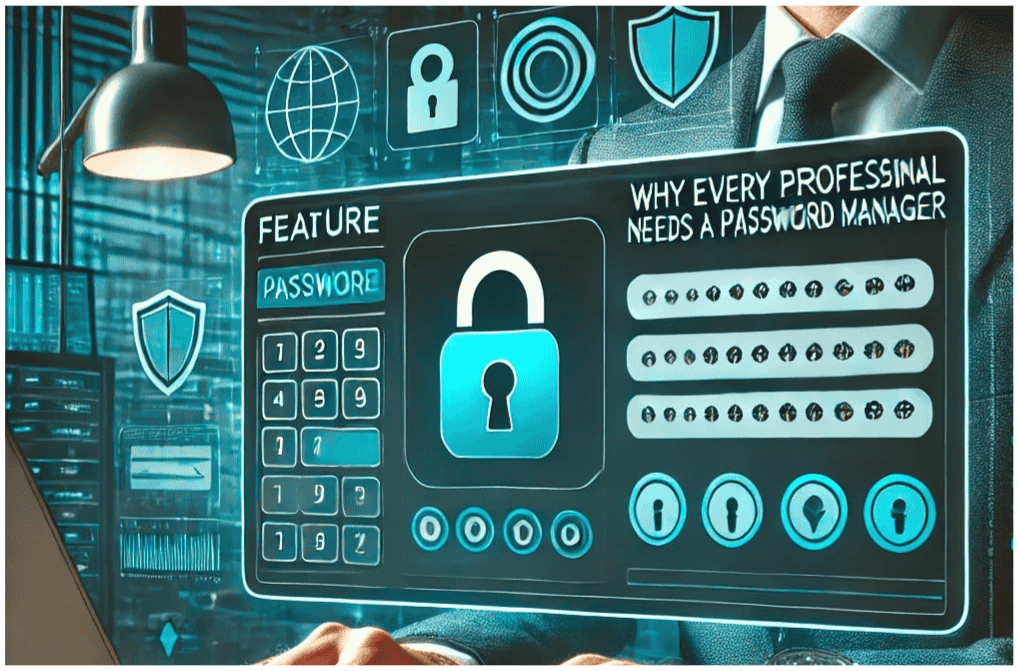🔐 Are you still juggling dozens of passwords, or worse, reusing the same ones?
As IT professionals, we manage sensitive systems and data daily. Yet, password mismanagement remains one of the biggest security risks. A compromised password can lead to devastating consequences — from data breaches to system downtime.
In my latest blog post, I explore why every IT professional should be using a password manager. I cover how these tools simplify your life, enhance security, and prevent credential-related attacks. Plus, I share practical insights on choosing the right password manager for your needs.
Why a Password Manager is a Must-Have for Your Digital Life
In today’s digital landscape, managing passwords has become a critical aspect of maintaining cybersecurity. For IT professionals, the stakes are even higher. With access to sensitive systems, confidential data, and administrative privileges, weak or reused passwords can pose serious risks to organizations. Yet, even the most tech-savvy individuals can struggle with the growing number of accounts and login credentials.
This is where password managers come in. They offer a secure, efficient, and reliable way to store and manage passwords, eliminating the need to remember dozens of complex logins. Beyond convenience, they provide advanced features like encrypted storage, password generation, and breach monitoring — essential tools for anyone responsible for safeguarding digital assets.
Whether you’re a system administrator, software developer, or cybersecurity analyst, using a password manager is not just a matter of convenience — it’s a necessity. In this post, we’ll explore why every IT professional should adopt a password manager and how it can significantly enhance both personal and organizational security.
The Role of Password Managers in IT Security
1. Strengthen Password Security
- Generate complex, unique passwords for every account using a password manager.
- Enforce company-wide password policies to ensure strong password creation.
- Regularly rotate passwords for critical accounts using automated reminders.
2. Prevent Credential Reuse and Weak Passwords
- Use password health reports to identify and replace weak or reused passwords.
- Educate team members on the risks of credential reuse and how to manage passwords effectively.
- Implement password entropy checks to ensure secure password creation.
3. Enable Secure Storage and Encryption
- Ensure sensitive credentials are stored in an encrypted vault using zero-knowledge encryption.
- Use local or cloud-based storage options based on security needs.
- Regularly back up encrypted password data to prevent loss.
4. Support Multi-Factor Authentication (MFA)
- Integrate password managers with MFA tools for layered protection.
- Use built-in authenticator features to generate TOTP (Time-based One-Time Passwords).
- Enable biometric or hardware token authentication for vault access.
5. Monitor for Data Breaches
- Enable breach monitoring features to receive alerts if passwords are compromised.
- Perform regular security audits using the manager’s built-in reporting tools.
- Provide IT teams with visibility into organizational password security practices.
6. Facilitate Secure Credential Sharing
- Use secure password-sharing features for team access to shared accounts.
- Apply granular access controls and permissions to limit exposure.
- Audit password access logs to monitor sharing activity.
7. Support Incident Response and Recovery
- Quickly revoke or update compromised passwords across multiple accounts.
- Utilize audit logs to trace unauthorized access attempts.
- Implement role-based access control (RBAC) to minimize damage in case of breaches.
Which Password Manager Should You Use?
1. Key Factors to Consider When Choosing a Password Manager
- Security Features: Ensure it offers end-to-end encryption, zero-knowledge architecture, and multi-factor authentication (MFA) support.
- Ease of Use: Look for an intuitive interface with browser extensions and mobile apps for convenient access.
- Cross-Platform Support: Ensure it works across various operating systems (Windows, macOS, Linux) and mobile devices.
- Password Generation and Storage: Choose a manager with a robust password generator and secure storage.
- Sharing and Collaboration: If you work in a team, opt for a solution with secure sharing features and role-based access control.
- Breach Monitoring: Some managers offer dark web monitoring and alerts if your credentials are compromised.
- Pricing and Plans: Consider whether you need a free version, a paid personal plan, or a business plan with additional features.
2. Popular Password Managers for IT Professionals
Here’s a comparison of reliable options:
| Password Manager | Best For | Notable Features | Pricing |
|---|---|---|---|
| Bitwarden | Open-source enthusiasts | End-to-end encryption, free plan available | Free / Paid Plans |
| 1Password | Enterprise security management | Advanced security features, SSO integration | Paid Only |
| LastPass | General users and small teams | Secure password sharing, breach monitoring | Free / Paid Plans |
| Dashlane | Personal and business users | VPN included, dark web monitoring | Paid Only |
| NordPass | Simplicity and secure storage | XChaCha20 encryption, affordable pricing | Free / Paid Plans |
| Keeper | Businesses with compliance needs | Compliance reports, role-based access control | Paid Only |
3. Recommendations Based on Your Needs
- If you prefer open-source solutions: Go with Bitwarden.
- For enterprise-level security with SSO: Choose 1Password or Keeper.
- Need basic password management for free? LastPass or Bitwarden Free are good choices.
- Looking for VPN integration and extra security? Consider Dashlane.
- For the best value without sacrificing security: NordPass offers affordable plans.
Final Thoughts
Password managers are no longer just a convenience — they are a necessity for IT professionals. From securely storing complex passwords to preventing credential reuse and simplifying access management, these tools play a critical role in maintaining strong cybersecurity.
By adopting a reliable password manager, you can reduce the risk of security breaches, enhance productivity, and ensure both personal and organizational data remain protected. With a variety of options available, choosing the right password manager tailored to your needs will further strengthen your digital security posture.
In a field where protecting sensitive information is paramount, using a password manager is one of the simplest yet most effective steps you can take. Don’t wait for a security incident to highlight its importance — take control of your passwords today.




